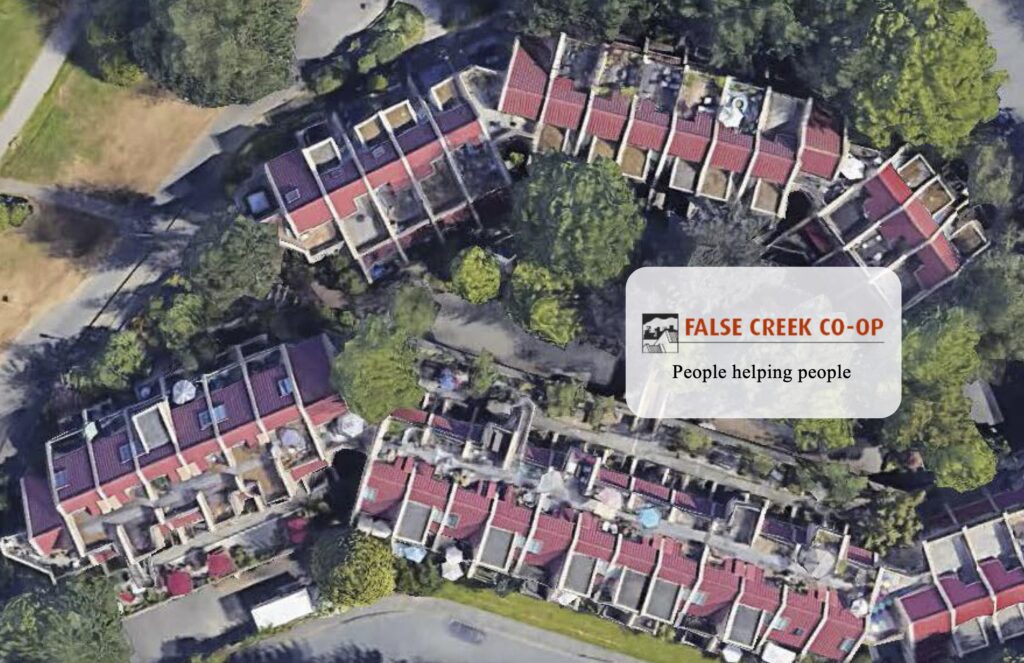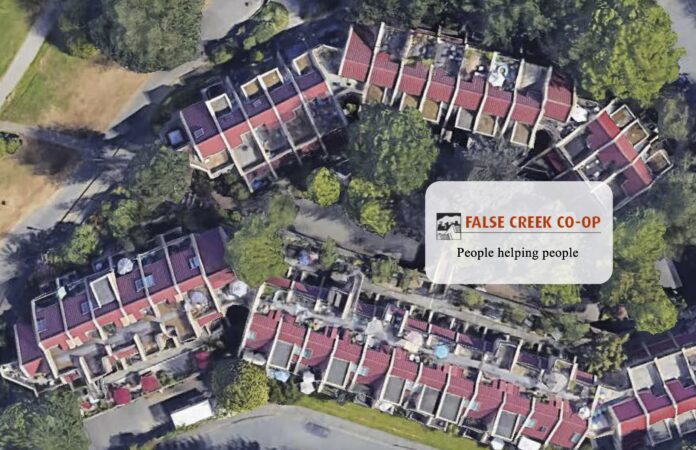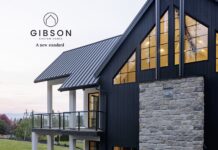
Click here to view the magazine.
People helping people
The False Creek Co-operative Housing Association (FCCHA) is an organization providing affordable housing at a prime location around Charleston Park, in the False Creek South neighborhood in the City of Vancouver, British Columbia. Since forming almost 40 years ago with the motto of “people helping people,” their vision has been to create an inclusive, respectful community that is economically, environmentally, and socially sustainable. To achieve that vision, they have used multiple tactics: they have operated with a unique self-subsidy model where higher income members contribute to a subsidy pool to support lower income members; they have formed collaborative relationships with financial institutions and service providers; and they have invested in multiple phases of building remediation – including an upcoming fourth phase, which will be project managed by C3 Alliance Corp.
The FCCHA was formally established in 1974 in Vancouver as a non-profit housing organization with a mission to build non-profit housing and create a self-subsidy mixed income thriving democratic community. Housing co-ops are incorporated under provincial legislation. Unlike other business corporations, housing co-ops and other types of co-operatives (such as credit unions) share a set of seven international co-op principles: voluntary and open membership, democratic member control, member economic participation, autonomy and independence, education, training and information, cooperation among cooperatives, and concern for community.
The FCCHA was built near the beginning of the investment period by the federal government to stimulate co-op housing development with a target to create more affordable housing for lower and moderate income individuals and families. At the time of building the co-op, interest rates were running at over 12 per cent and the co-op received an eight per cent fixed interest mortgage for a 60 year mortgage. Fortunately, after 40 years, Canada Mortgage and Housing Corporation (CMHC) allowed the FCCHA to buy out the mortgage without penalty and secure a more reasonable mortgage rate. The FCCHA is one of two housing co-ops in Vancouver based on a unique CMHC program in which higher income households pay into a subsidy pool to support lower income households, rather than relying on government housing supplements.
Chris Whyte is the president of the FCCHA. His family has lived in the co-op since 1991, and over the years he has served in various roles and on various committees before being elected president in December 2022. He describes how the co-op is governed, and how that governance supports the co-op’s vision of building a community together that contributes to everyone’s well-being:
“What is often not recognized is that many housing co-ops such as the FCCHA are, in fact, non-profit housing developers,” he explains. “They are responsible for planning, securing financing, overseeing project development, and addressing the operational and capital expenses associated with running and sustaining a non-profit social enterprise business.”
“The way it works is members elect a board of directors. The board recommends the creation of standing committees – finance, membership, building maintenance, remediation task force, gardening, education, et cetera – and their terms of reference. Those terms are then approved by co-op members.”
“A unique aspect of non-profit housing co-ops is that part of their mission is to create and sustain ‘at-cost’ housing for their members,” Chris continues. “Members participate as equal participants – with one vote per member – in decisions regardless of unit size or income. At general meetings, the membership approves housing charges and also co-op policies. Members are ‘owners’ – they pay monthly housing charges, not rent; they have a voice in all decisions that impact their housing and community; and they volunteer their time on committees or tasks.”
“As a core concept, housing co-ops ensure security of tenure that improves social opportunities and helps members address economic hardships during their life cycle. Most importantly, housing co-ops foster a sense of belonging that encourages mutual support among members of all ages and stimulates engagement across diverse backgrounds – ethnic, cultural, gender and sexual orientation, single parents, couples, seniors, et cetera.”
In the case of the FCCHA, encouraging that mutual support and communal engagement was baked into the very planning of the community. Back in 1974, the founding members, in collaboration with a hired architect group, focused on building enclaves with internal courtyards and amenities that fostered both formal and informal community engagement. In addition to creating meeting rooms, the co-op designed play spaces where children would feel safe, and where members could have outdoors BBQ’s or informal gatherings with neighbours and friends.
Chris partly credits the longevity of the FCCHA to that initial forward-thinking planning. He also partly credits the co-op’s enduring success to its unique self-subsidy model, as well as its relatively large size of– with 170 units, he says the co-op has “sufficient membership with a broad range of volunteer skills, expertise and knowledge,” which “creates fiscal viability, flexibility and resilience.”
“There is never a shortage of applicants who want to move in, given the scarcity of affordable housing for families in Vancouver. Interviews with applicants provide them with an opportunity to learn more about the co-op and to consider whether cooperative housing is a good fit for them. Once a family is approved, they are placed on the waiting list. The membership committee looks at a variety of parameters such as income, skills, family size, diversity gaps, and considers direction from the board.”
“As a housing co-op, we especially seek potential new members interested in co-op values and participating in co-op committees and activities. At the inception of the FCCHA, close to 10 per cent of the co-op’s membership were Ismaili refugees and we have continued to accept refugee families from more recent wars and conflict.”
Building remediation
In recent years, the FCCHA has invested $15 million across three phases of remediation. Now, in collaboration with project management firm C3 Alliance Corp, they are embarking on a fourth phase.
Richard Evans is a professional architect and the co-chair of the FCCHA’s remediation taskforce. He and his family have lived in the co-op since 1986, and he has been personally involved in several of their remediation phases. Looking back on those early phases, he recalls they started with the need to address common remediation issues that were facing an estimated 65,000 “leaky condos” in British Columbia.
“Fortunately, the co-op had professional talent, including several architects, builders and people with project management and financial skills,” he says. “In addition, we had the expertise of Cana Management Services Ltd, a co-op management service provider.”
To address the first phase of remediation (which was valued at roughly $7.4 million) the FCCHA established a Remediation Task Force and hired Morrison Hershfield, a market-leading engineering firm. Similar to other types of ownership tenures facing significant remediation costs, the co-op needed to raise funds for this work. They increased their housing charges by 30 per cent for members paying maximum, renegotiated their land lease with the City of Vancouver (deferring payments), and was eligible for the BC Homeowners Protection program, which paid interest payments on loans for 10 years.
During Phase 1, the primary focus was on rain screening all walls with high exposure to weather and replacing adjoining windows and flashings on its multi-leveled townhouses.
Phase 2a (valued at $2.7 million) focused on rain screening of all exposed surfaces on the apartment block (24 units). It also included the majority of metal sloped roofing, and some spot remediation to some of its flat roofs.
Phase 2b (which was funded by a $1.4 million CMHC grant and $550,000 from the co-op capital reserves) allowed the co-op to replace all 170 patio doors. The adjoining walls and roof membranes were rain screened to higher specifications for better weather protection as well as new perimeter seals for some of homes.
Phase 3 continued remediating areas of rain screening and the remaining perimeter seals for units over parking, the rebuilding of two land bridges, completion of the metal roofing, as well as completion of some of the flat roofing. The cost of the work was estimated to be $2 million during a time of rapidly escalating construction costs. All bids were much higher than anticipated. Tender quotes were twice the estimated cost, which led to a reduction of scope by 50 per cent.
Phase 4 is currently being planned to address five major remediation projects, including: re-piping the apartment building, replacing the majority of flat roof membranes, wooden stair replacements and addressing two building blocks requiring rain screening and elevator replacement. In addition, a detailed review of each building block will be performed to prepare a comprehensive asset management review to inform the co-op’s interest in preservation and renewal of affordable housing.
As part of their remediation efforts, the FCCHA is also investigating other ways to reduce their carbon footprint and better address weather related challenges. For instance, with the need to replace many of their flat roofs, they foresee there may be an opportunity for rainwater collection. Looking to the longer-term, the co-op’s goal is to meet net-zero energy standards by 2050 – they acknowledge that won’t be a simple task, but they are committed to maintaining their infrastructure “forever,” Richard says, and achieving environmental sustainability is a key part of that commitment.
Richard, as co-chair of the remediation task force, is leading the planning of the upcoming fourth phase of remediation. He calls that fourth phase a “continuation” of the previous phases, as well as part of a strategy of “constant upgrading” that the co-op has engaged in over the past 15 years in response to the needs of their 15 aging buildings. He also says that because they have 15 buildings, not just one or two, they decided to bring on a project manager:
“It’s simply overwhelming for a volunteer organization to deal with the day-to-day managing of a program for the upgrading and renewal of that many buildings,” he explains. “It’s a challenging project. We needed to find the right partner to help us get it done on schedule and on budget.”
According to Richard, when evaluating those prospective partners, it was important to him that they found a company with architectural expertise, as their buildings were built in the 1970s – which makes them essentially heritage buildings, even if they’re not officially heritage-listed. That means they are complicated to work on and they needed a firm that had the architectural experience to tackle those complications.
The FCCHA also looked for a partner who understood the co-op’s mission and how important it was, Richard says. Whoever they worked with had to be “aware of the importance of our buildings, the importance of our community, the importance of affordability, and the importance of maintaining our infrastructure long into the future.”
“So it was a unique blend of skills and experience that we were looking for and it was actually a challenge to find the right fit,” Richard recalls. “We went out to a number of different firms.”
According to Richard, C3 Alliance Corp was ultimately the right choice for a few reasons, but the main reason was their alignment on the importance of “community.” As an architect, Richard has done several projects up north, where C3 Alliance Corp works frequently with First Nations communities, finding innovative and inclusive solutions for resource development. He had seen first-hand their commitment to working with communities, industry leaders, and governments to build the relationships needed for project success – so he had a lot of confidence introducing and recommending them to the rest of the team at the FCCHA.
Building partnerships with the larger community
As previously mentioned, the FCCHA is situated in False Creek South, on leased land owned by the City of Vancouver. It is a purpose-built community founded on a set of principles to create an integrated mixed income community. However, at the end of 2020, their model was threatened when the City of Vancouver’s Real Estate and Facility Management (REFM) Report was released. That report recommended to Council and the public the demolition of all the existing affordable non-profit housing and co-op housing at the end of their leases, with an opportunity for the replacement with newer higher density housing – which would be dependent on federal and provincial government investment.
“With over 6,000 residents living in False Creek South across different tenure types, there was a significant community and general public political outcry to preserve the existing moderate density affordable housing,” Chris recalls.
In response to that outcry, in October 2021, Vancouver City Council voted unanimously on the following principles to guide the future planning of False Creek South:
- Ensure the retention of existing affordable housing to maximize affordability.
- Work with the non-profit sector (also called the community housing sector) to deliver all forms of housing tenure.
- Target an income mix based on Vancouver renter household income of one-third lower income, one-third middle income, and one-third higher income.
- Build additional affordable and co-op housing.
- And pursue deep engagement with FCS Neighbourhood Association and other interested community groups and stakeholders.
Moving forward, the FCCHA is committed to guiding their future development with all those principles in mind. A big part of that, according to Chris, is committing to a “comprehensive community engagement process with our members and the False Creek South community.” In collaboration with those stakeholders, Chris says the co-op will “ensure that future generations across all income levels are able to live, work, and retire in Vancouver.”
“Our plan is to live in perpetuity in False Creek,” he concludes. “In order to do that, we need to create and maintain a community that is sustainable – economically sustainable, environmentally sustainable, and socially sustainable.”
For more on the False Creek Co-operative Housing Association, their mission, their neighborhood, and to have a look at their buildings and amenities, visit https://falsecreekco-op.com/









